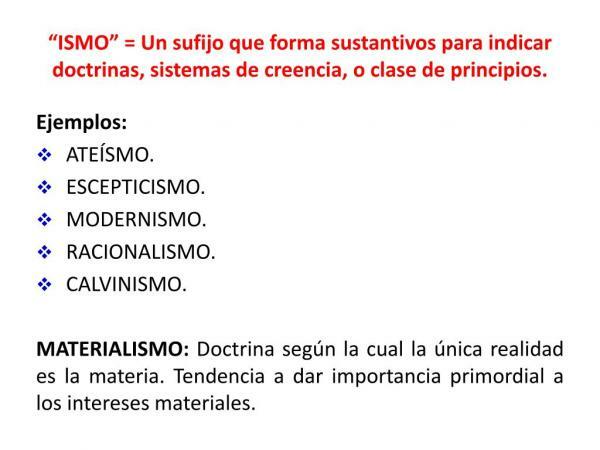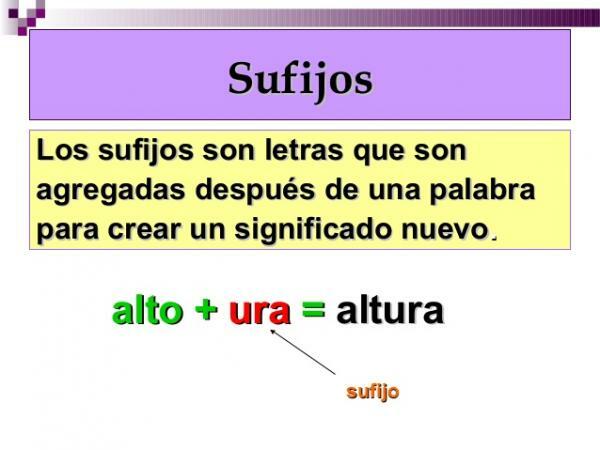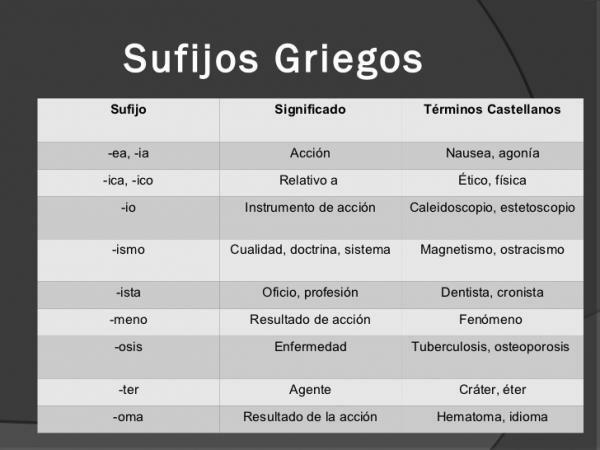Suffix -ISM: definition and examples

Image: Slideserve
Spanish has tools to change the nature of words. This is achieved by adding to an original word different suffixes or prefixes. In this lesson from a TEACHER we want to show you what is the suffix -ismo its definition and examples so that you can easily understand them and know how to use it in any sentence or text. In order to start, it is necessary to know what suffixes are in order to delve into the definition of the concept at hand.
In order to define what are the suffixes Finished in –ismo we must know what suffixes are. These particles are morphemes that have a number of characteristics. These morphemes are always attached to words later, that is, they always do so at the end of the word. Also these are always tonics.
On the other hand, the suffixes have the morphological mission is to later join a lexeme, or what is the same, the root of a word, in order to generate new ones. So we could say that these can be classified according to their meaning.
Suffixes according to their meaning
The suffixes with meaning are those that when joining a root or lexeme later have a own semantic load. This semantic load is going to join that of the word itself. This will make its meaning refer to different concepts, these can be:
- Actions
- Places
- Actions
- Professions
- Qualities
- Gentile
- Collectives
- Superlatives
Nominalizing suffixes
These make the words when joined with this suffix create new ones that can be classified as nouns. These nouns, in turn, can generate different types. That is, they can be classified according to the grammatical category of the word to which they have been attached, thus creating:
- Deadjective nouns
- Deverbal nouns
- Denominational nouns

Image: Slideshare
Now that you know what suffixes are and how they can form other words, let's focus on what the suffix –ism is. It is, therefore, a tonic morpheme that functions as a derivative morphological particle that can be attached to adjectives and nouns.
Its function is to form new words by derivation. These new words can be classified as nouns and therefore will be nominalizing suffixes. That is, taking into account what we have seen before, they will be able to form deadjective nouns and denominal nouns. On the other hand, the suffix –ismo has 6 senses different or semantic loads. These are:
- Form nouns that refer to theories, doctrines or systems.
- Form nouns to refer to attitudes, tendencies or behaviors.
- Form nouns that refer to sports, activities in general, or sports.
- Form nouns that point to technical or scientific terms.
- Form nouns that refer to cultural movements.
- Form nouns that refer to an expression of a language.
Let's see below some example of each of these semantic loads:
- Calvinism (doctrine)
- Capitalism (doctrine)
- Christianity (doctrine)
- Selfishness (attitude)
- Alcoholism (behavior)
- Pessimism (attitude)
- Cycling (sport)
- Athletics (sport)
- Astigmatism (scientists)
- Impressionism (cultural)
- Surrealism (cultural)
- Spanishism (language)
- Colombianismo (language)

Image: Slideshare
Next we will see more word examples containing the suffix –ismo.
- Communism: system in which goods are collectively owned
- Platonism: Plato's doctrine
- Socialism: system based on the control of the economy by the state
- Cycling: sport practiced by cyclists
- Collecting: fondness for collecting certain objects
- Mountaineering: sport that consists of ascending the mountains
- Isomorphism: quality of isomorph
- Synchronism: quality of what acts at the same time or frequency
- Classicism: artistic movement that follows classical ideals
- Avant-garde: cultural movements of the late 19th century
- Anglicism: English word or expression introduced in another language
- Germanism: German word or expression introduced into another language
- Latinismo: word in its Latin form introduced into a language
- Pointillism: pictorial movement that uses the dot technique to make pictures
- Naturalism: literary movement
- Conformity: attitude of conformity
- Formalism: attitude of presenting something formally.
- Secrecy: behavior before a certain topic.
- Hedonism. Doctrine that establishes pleasure as the end and foundation of life.
- Empiricism. Doctrine that is based on experience.
- Monotheism. Doctrine that admits only one God.
These are just a few examples of words formed with the suffix –ismo and how each of them falls into a category. The truth is that by adding this suffix, you can create a new word in almost any word to achieve the senses that we have indicated above. As you can see, forming words of this type is very simple, and also identifying them in any context.
If you want to continue learning more about Spanish language, Linguistics or Grammar, be sure to visit our sections where you can find articles as suffix –ismo: definition and examples with which to continue improving your study. You can also find many more subjects that will help you continue learning day by day with updated content designed so that you can continue to evolve day by day.



